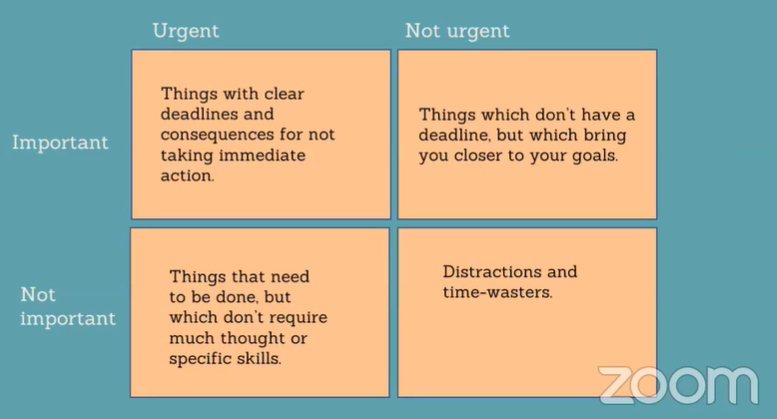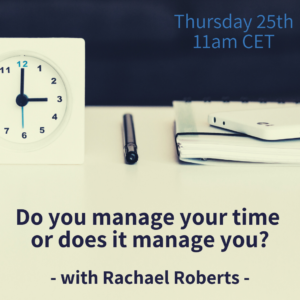It was great to have Rachael Roberts joining us for this week’s webinar. As we mentioned in the introduction, she has an extensive career in ELT which puts her in a great position to help other ELT professionals. Here are the links to some of Rachael’s resources:
- elt-resourceful.com
- The CELTA Teaching Compendium
- How to write Writing Materials from ELT Teacher 2 Writer
- Life-Resourceful: life, career and business coaching for ELT professionals
- Lightbulb Moments – Rachael’s Facebook group helping ELT professionals manage stress and gain balance
Not enough time – what’s the problem?
Is it a case of not saying no to things and taking too much on, or not managing your time effectively? For a lot of people, it’s likely to be a bit of both.
There’s also ‘fire-fighting mode’ where you’re constantly trying to catch up, with a never-ending to do list and get to the end of the day exhausted but with a feeling of not having achieved that much.
The problem is that you might not have enough time to think about time management and to consider what you need to prioritise, what you can say no to and how you can manage your time more efficiently.
Tracking time
Use an app like Toggl or Clockify to look at how much time you’re spending on each project. Observing what you do and change what you do, so having an app on might make you more efficient but either way, you may be surprised by the results. There was a comment about feeling ‘caught out’ but becoming more aware of just how much time you spend scrolling through social media or doing other ‘time-wasting’ activities can help you make conscious decisions to change those habits and as Rachael says, you don’t need to share your time audit with anyone else!
Budgeting time
We’re generally very good at budgeting our money – we have limited money to spend each month and have to make conscientious decisions about how to spend…to ensure we have enough money to cover the basics before we splurge out on something else.
We need to be careful to budget our time too and think about covering the basics before we splurge our time on something else.

The Eisenhower Matrix
This is a good grid to use to prioritise what you need to do. One point to note is that things in Not Important/Not Urgent (Box 4) are important too – things we do to relax and have fun shouldn’t not get done J It’s important as well to think about what things we put in this box – for example, exercise might seem Not Important and Not Urgent, but if we don’t include it as part of our routine, there will come a point where it is Important and Urgent (Box 1).
A lot of us don’t spend enough time in the Important/Not Urgent box (Box 2) – however, things we don’t focus on here tend to move to the Urgent box, which is how we can suddenly become overloaded. If you procrastinate, spend more time in Box 2 before things move to Box 1. Consciously make time for Box 2.
When you look at Box 3, it’s important to think carefully about what’s there – is it actually something Urgent which you need to do? Can it be delegated? Often these feel like the easy-wins – little tasks which feel urgent, and so we don’t get around to the big tasks in Box 1.
There was a comment as well about how in ELT we’re often focussing on the day’s lessons – so it’s worth setting aside time during your schedule to look ahead. There were lots of comments about the benefit of block planning, as well as some suggestions for new teachers to help them to plan more efficiently. One suggestion was to focus on one tool to showcase each week, rather than trying to incorporate too many different things from one week to the next. We also have more things up our sleeves as we gain more experience and having a list of fillers means that we can plan less as we know we have something we can use if we have an extra five minutes at the end of class. We also shared Chris Roland’s 300 Questions which are a great resource to have on hand – they’re in the Files section – and here’s a link to a thread from a while back about ways of storing and remembering games to use in class.
And this was a lovely quote in the comments box: It’s all about scheduling your priorities, not prioritising what’s on your schedule.
Saying No
We often have a tendency to be very excited in projects or not want to let people down and those two things together can lead to us being overwhelmed. Also, we know we’re competent people and feel we can do all these things! When you say yes to something, what does that mean you’re actually saying no to?
For example, if I say yes to this new class, I’m giving up that time which I usually spend with my family or the time I spend exercising, or the time I spend cooking a decent meal.
Three steps:
- recognise the pattern of always saying yes
- working out why you find it difficult to say no
- train yourself to step back and think before you agree to anything – ask for time to think about things rather than agreeing immediately
Check out Rachael’s post How to say no (without feeling bad about it)
Why time management isn’t enough…
There are two other important things you need to manage and budget: energy and focus.
How aware are you of the impact of what you’re eating on your energy levels and sustained energy?
Are you drinking enough water? Regular sipping is better than downing a whole glass when you realise you’re thirsty. There was a good tip in the comments to put marks of a 2l bottle to show how much you should be drinking every hour. You can also get apps which track your water intake.
Caffeine has a half-life of 6/7 hours and can affect your sleep but more importantly, it doesn’t stop you being tired – it’s like a painkiller in that it blocks the receptors that make you feel tired. Having too much coffee means you’re constantly blocking your body from telling you what it really needs.
Are you sleeping enough for you? Are you resting enough – meditating, napping (for a max. of 20mins so you don’t go into a deep sleep and feel groggy) or just doing nothing? Cal Newport (Deep Work) identified that the brain can only focus in a deep way for up to 4 hours a day so the things which are in Boxes 1 and 2 are good to focus on during those four hours. Scheduling rest into your day is a good way to ensure it happens.
How much are you moving during the day? This is not just about exercise but also moving around. Sitting too long has been shown to shrink the hippocampus (the part of the brain to do with memory). Again, there are apps which can give you reminders to move or stretch.
Time of the year, time of the week and even time of the day can have such a huge impact on our energy levels. Although it may feel like it makes sense to start the day checking your emails and ticking the easy things off your to do list, this is often the time of day when we are most able to concentrate and do the ‘deep work’ so you might prefer to leave those admin tasks til later in the day.
Scheduling the tougher tasks for earlier in the day can also help with procrastination. A quote attributed to Mark Twain is: “If it’s your job to eat a frog, it’s best to do it first thing in the morning. And if it’s your job to eat two frogs, it’s best to eat the biggest one first.”
Couple of further suggestions here:
- Check out yoga nidra which is often associated with sleep, but can also be used during the day
- Schedule a Joe Wicks workout into your day
- The Art of Rest by Claudia Hammond was another recommended read from the comments
Avoiding distractions
These can be external or internal. Dealing with an external distraction could include getting up earlier to work when others are still asleep, putting a Do not disturb sign on the door or working with headphones and having ambient noise on – such as Coffivity which provides the background noise of a café.
What other external distractions are you able to control? Turning off notifications is a great way to help you focus and help you to feel less stress. These can affect your adrenaline, dopamine and cortisol levels and your fight/flight response, which impacts your ability to work. It’s easy to become addicted to the dopamine hit you get every time a new notification comes in but each time you switch from one task to another – pausing your lesson planning to see who’s commented on your Facebook post – there’s a price to pay. A day’s worth of flipping between tasks could mean we waste around 40% of our working time!
How mindful are you of tech distractions? Forest is an app which can help to keep you off your ‘distraction sites’ as you can set it for a certain amount of time during which a tree will grow if you steer clear of your blocked sites. It will tell you to get back to work if you try to visit one of those sites and if you ignore it, the tree will eventually die. Study Bunny was also mentioned in the comments.
Pomodoro Technique
Work for 25 minutes straight and then have a five-minute break to get up and move around. You do four Pomodoros and then you can take a longer break. You can find it makes you more efficient J
There’s also the Japanese principle of Kaizen – doing things for one minute.
What’s the attraction of the distraction?
If you’re still avoiding doing things, it’s important to dig deeper and think mindfully about why you’re looking for distractions. Are you feeling anxious about what you’re doing? Are you feeling resentful of the amount of work you have and feeling you’re not being paid enough?
Mindfulness has a positive effect on the brain and can strengthen the links between the pre-frontal cortex and the amygdala and can help you to understand why you’re behaving in certain ways.
Rachael mentioned the Mindfulness and EFL group which Simon set up and her ebook 30 ways to Mindfulness.

1 thought on “Do you manage your time or does it manage you?”